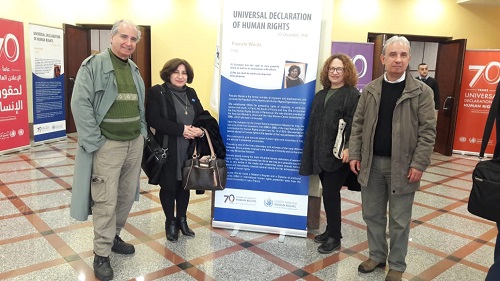
This is testament that girls, wherever you are, you can be anything without limits..." said Rebeca Gyumi of Tanzania. "It is important for young people to understand that we are the ones we have been waiting for; it is crucial to be brave and speak our truths; it is what is going to improve our communities and our countries."
Gyumi, along with Joênia Wapichana of Brazil, Asma Jahangir (posthumously) of Pakistan and Frontline Defenders based in Ireland, was the recipient of the 2018 UN Human Rights Prize. The prize was awarded at United Nations headquarters in New York. It recognizes the work of selected human rights defenders around the world.
UN General Assembly President María Fernanda Espinosa Garcés said the prize was a recognition of not only the work of the four winners, but also "a message of gratitude to all human rights defenders, because their sacrifices and constant dedication help us move forward towards societies that are less unfair and unequal."
"The international community is grateful for your efforts to promote all human rights for all people. Thank you for your essential role in advancing peace, sustainable development and human dignity in our world," said UN Secretary-General António Guterres.
UN High Commissioner for Human Rights, Michelle Bachelet, said she was moved not only by the winners’ courage, but also by the impact of their achievements.
"Defending human rights is not just a noble act in itself but an essential part of how societies solve problems; right wrongs; advance towards peace, inclusion and sustainable prosperity".
In a panel discussion with the winners, Andrew Gilmour, Assistant Secretary-General for Human Rights, said human rights defenders render their communities, vulnerable groups, their countries and the whole of humanity an extraordinary service. All too often, however, governments do not appreciate the true value of human rights defenders.
"They treat them instead as a threat, denigrate them as terrorists or criminals, harass them, beat them, lock them up. All too often, human rights defenders pay the ultimate price for their convictions," he said.
As an indigenous woman activist, winning the UN Human Rights Prize "shows that our constant struggle for human rights is the same as in the rest of the world," said Joênia Wapichana, awardee from Brazil.
"It is important for me to have this recognition because in Brazil, we have continued to see a relentless attack on our rights and to our cultural heritage since the beginning of the republic," she said.
Munizae Jahangir, accepting the award on behalf of her mother Asma Jahangir, said her mother would have wanted to share the award with other defenders.
"She believed that human rights are intrinsically linked to democracy. That in order to have equality, democracy must be the prerequisite," she said.
Andrew Anderson, Executive Director of Frontline Defenders, wants to use the Human Rights Prize and the occasion of the 20th anniversary of the Declaration on Human Rights Defenders to call for the release of human rights defenders imprisoned for their work.
"It would be really good if we could use the opportunity of all the celebrations and commemorations we are having these days to also focus attention on those stuck in prison because they stand up for human rights," he said.


